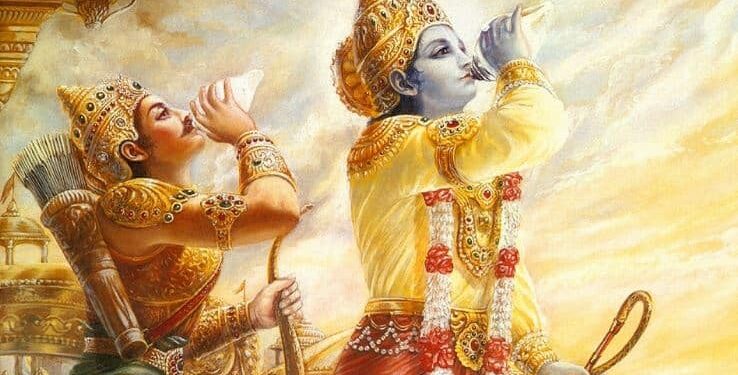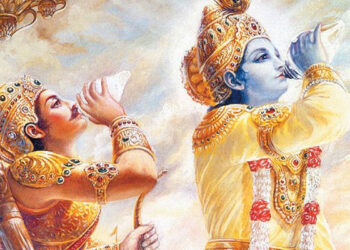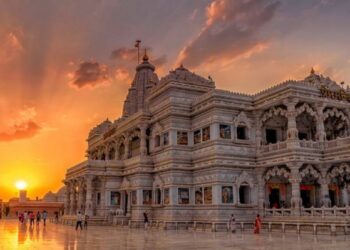TEXT 37
vṛṣṇīnāṁ vāsudevo ‘smi
pāṇḍavānāṁ dhanañjayaḥ
munīnām apy ahaṁ vyāsaḥ
kavīnām uśanā kaviḥ
SYNONYMS
vṛṣṇīnām—of the descendants of Vṛṣṇi; vāsudevaḥ—Kṛṣṇa in Dvārakā; asmi—I am; pāṇḍavānām—of the Pāṇḍavas; dhanañjayaḥ—Arjuna; munīnām—of the sages; api—also; aham—I am; vyāsaḥ—Vyāsa, the compiler of all Vedic literature; kavīnām—of all great thinkers; uśanā—Uśanā; kaviḥ—the thinker.
TRANSLATION
Of the descendants of Vṛṣṇi I am Vāsudeva, and of the Pāṇḍavas I am Arjuna. Of the sages I am Vyāsa, and among great thinkers I am Uśanā.
PURPORT
Kṛṣṇa is the original Supreme Personality of Godhead, and Baladeva is Kṛṣṇa’s immediate expansion. Both Lord Kṛṣṇa and Baladeva appeared as sons of Vasudeva, so both of Them may be called Vāsudeva. From another point of view, because Kṛṣṇa never leaves Vṛndāvana, all the forms of Kṛṣṇa that appear elsewhere are His expansions. Vāsudeva is Kṛṣṇa’s immediate expansion, so Vāsudeva is not different from Kṛṣṇa. It is to be understood that the Vāsudeva referred to in this verse of Bhagavad-gītā is Baladeva, or Balarāma, because He is the original source of all incarnations and thus He is the sole source of Vāsudeva. The immediate expansions of the Lord are called svāṁśa (personal expansions), and there are also expansions called vibhinnāṁśa (separated expansions).
Amongst the sons of Pāṇḍu, Arjuna is famous as Dhanañjaya. He is the best of men and therefore represents Kṛṣṇa. Among the munis, or learned men conversant in Vedic knowledge, Vyāsa is the greatest because he explained Vedic knowledge in many different ways for the understanding of the common mass of people in this Age of Kali. And Vyāsa is also known as an incarnation of Kṛṣṇa; therefore Vyāsa also represents Kṛṣṇa. Kavis are those who are capable of thinking thoroughly on any subject matter. Among the kavis, Uśanā, Śukrācārya, was the spiritual master of the demons; he was an extremely intelligent and far-seeing politician. Thus Śukrācārya is another representative of the opulence of Kṛṣṇa.
TEXT 38
daṇḍo damayatām asmi
nītir asmi jigīṣatām
maunaṁ caivāsmi guhyānāṁ
jñānaṁ jñānavatām aham
SYNONYMS
daṇḍaḥ—punishment; damayatām—of all means of suppression; asmi—I am; nītiḥ—morality; asmi—I am; jigīṣatām—of those who seek victory; maunam—silence; ca—and; eva—also; asmi—I am; guhyānām—of secrets; jñānam—knowledge; jñāna-vatām—of the wise; aham—I am.
TRANSLATION
Among all means of suppressing lawlessness I am punishment, and of those who seek victory I am morality. Of secret things I am silence, and of the wise I am the wisdom.
PURPORT
There are many suppressing agents, of which the most important are those that cut down miscreants. When miscreants are punished, the agency of chastisement represents Kṛṣṇa. Among those who are trying to be victorious in some field of activity, the most victorious element is morality. Among the confidential activities of hearing, thinking and meditating, silence is most important because by silence one can make progress very quickly. The wise man is he who can discriminate between matter and spirit, between God’s superior and inferior natures. Such knowledge is Kṛṣṇa Himself.


















